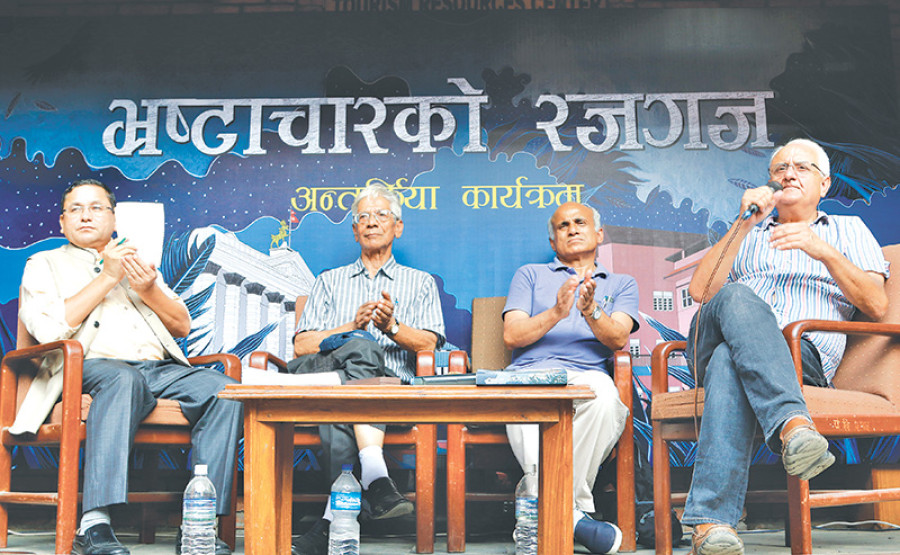Entertainment
‘Democracy degenerates into despotism if corruption is unchecked’
In light of the unprecedented rise in corruption in every level of governance in the country, an interaction program on author Hari Bahadur Thapa’s latest book, Rajgaj, was held at the Nepal Tourism Board in the Capital on Saturday.
In light of the unprecedented rise in corruption in every level of governance in the country, an interaction program on author Hari Bahadur Thapa’s latest book, Rajgaj, was held at the Nepal Tourism Board in the Capital on Saturday. Facilitated by journalist Kanak Mani Dixit, panellists included author Thapa, cartoonist Durga Baral (Batsyayan) and surgeon and activist Dr Govind KC.
“More than discussing just the book, let’s take this opportunity to dissect how and why corruption has become so rooted in all forms of governance in Nepal,” Dixit said kickstarting the conversation. “The book, Rajgaj, traces corruption from its historical context to its current form. It seems we have been talking about corruption for a long time but it continues unabated. So, it begs the question on if it can even be rooted out.”
Author Thapa agreed that corruption has ballooned to a scale that was unimaginable just a few decades ago. “During the Panchyat era, there was a big scandal that was popularly known as the ‘Gai Kanda’. During that incident, a minister was widely derided for misappropriating Rs 700,” Thapa said, “But today, billions of Rupees are being swindled. It almost feels that even millions of rupees being misappropriated doesn’t make the headlines anymore.”
One of the reasons for corruption spreading uncontrollably in every level of governance, Thapa mused, was because people aspiring to become “overnight successes” have grown exponentially as well. “Say, during the Rana Regime, there were only a select few who could aspire to social and financial mobility. That circle of aspirants grew during the Panchayat era; then it ballooned during the period of post-panchyat constitutional monarchy,” Thapa said, “Now it feels like a free for all, everybody dreams of going from rags-to-riches overnight, and corruption is the quickest avenue to do so. What is worrying, however, is that corruption is no longer just at the personal level but at the policy-level. When that happens, as Aristotle said, Democracy degenerates into Despotism.”
Also speaking on how corruption has ballooned to an unprecedented scale, cartoonist Durga Baral—who has been satirising the Nepali society through his sketches since the Panchyat era—said, “You could say we cartoonist are in quite a conundrum. When corruption was still at the personal level, the perpetrators had a face and we depicted them large paunches. But now that there is corruption at the policy-level, it has no face. How do you depict that?”
Adding to the cartoonist’s observation, Thapa said, “Corruption has become faceless because power has become so centralised. In truth, there are only three or four political leaders pulling all the strings, in every aspect of governance. This is what has created an environment for policy-level corruption to flourish.”
But how can such wide-spread corruption be curbed? Dr Govinda KC, who has been leading the charge for the regulation of malpractices in the medical education sector, said that corruption can only be checked if the society speaks out. “When corruption grows to such an unprecedented scale, the onus particularly falls on the members of the society to name and shame the perpetrators. Laws can only do so much when the lawmakers themselves are corrupt. It is essential that the society itself disowns the corrupt. And hopefully if we can change in one sector—as we are trying to with the medical education sector—it will lead to a domino effect that ripples into all other sectors.”
Apart from the society disowning the corrupt, Thapa said that it was necessary to document the corruption taking place today for posterity. “That was a big motivation behind me writing this book. Public memory can be a fickle thing; which is why we need documentation. Without it, corruption is in the danger of becoming a folklore—something vaguely remembered but impossible to pin down.”




 9.7°C Kathmandu
9.7°C Kathmandu









